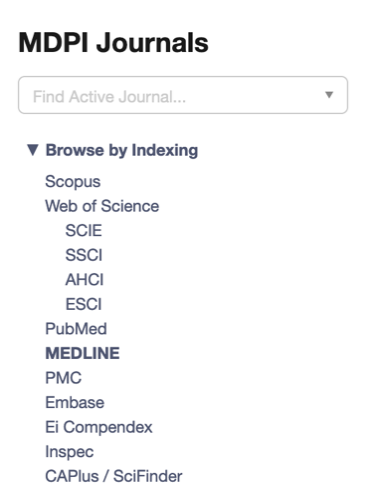
Journal Menu
► ▼ Journal Menu-
- Nanomaterials Home
- Aims & Scope
- Editorial Board
- Reviewer Board
- Topical Advisory Panel
- Instructions for Authors
- Special Issues
- Topics
- Sections & Collections
- Article Processing Charge
- Indexing & Archiving
- Editor’s Choice Articles
- Most Cited & Viewed
- Journal Statistics
- Journal History
- Journal Awards
- Society Collaborations
- Conferences
- Editorial Office
Journal Browser
► ▼ Journal BrowserNeed Help?
Announcements
9 August 2024
Nanomaterials 2024 Best Paper Award—Winners Announced
We are pleased to announce the winners of the Nanomaterials 2024 Best Paper Award. All papers published in 2022 in Nanomaterials (ISSN: 2079-4991) were considered for the award. After a thorough evaluation of the originality and significance of the papers, citations, and downloads, six winners were selected, as listed below.
Articles:
“Effects of Solvent and Electrospinning Parameters on the Morphology and Piezoelectric Properties of PVDF Nanofibrous Membrane”
by Jia-Yi Yin, Carlo Boaretti, Alessandra Lorenzetti, Alessandro Martucci, Martina Roso and Michele Modesti
Nanomaterials 2022, 12(6), 962; https://doi.org/10.3390/nano12060962
“Nanoparticles Surface Chemistry Influence on Protein Corona Composition and Inflammatory Responses”
by Laura E. González-García, Melanie N. MacGregor, Rahul M. Visalakshan, Artur Lazarian, Alex A. Cavallaro, Svenja Morsbach, Agnieszka Mierczynska-Vasilev, Volker Mailänder, Katharina Landfester and Krasimir Vasilev
Nanomaterials 2022, 12(4), 682; https://doi.org/10.3390/nano12040682
“Ultrasonic-Assisted Synthesis of N-Doped, Multicolor Carbon Dots toward Fluorescent Inks, Fluorescence Sensors, and Logic Gate Operations”
by Jiali Xu, Kai Cui, Tianyu Gong, Jinyang Zhang, Zhirou Zhai, Linrui Hou, Fakhr uz Zaman and Changzhou Yuan
Nanomaterials 2022, 12(3), 312; https://doi.org/10.3390/nano12030312
Reviews:
“Nanoplastics and Human Health: Hazard Identification and Biointerface”
by Hanpeng Lai, Xing Liu and Man Qu
Nanomaterials 2022, 12(8), 1298; https://doi.org/10.3390/nano12081298
“Reactive Oxygen Species Formed by Metal and Metal Oxide Nanoparticles in Physiological Media—A Review of Reactions of Importance to Nanotoxicity and Proposal for Categorization”
by Amanda Kessler, Jonas Hedberg, Eva Blomberg and Inger Odnevall
Nanomaterials 2022, 12(11), 1922; https://doi.org/10.3390/nano12111922
“A Comprehensive Review of Graphitic Carbon Nitride (g-C3N4)–Metal Oxide-Based Nanocomposites: Potential for Photocatalysis and Sensing”
by Amirhossein Alaghmandfard and Khashayar Ghandi
Nanomaterials 2022, 12(2), 294; https://doi.org/10.3390/nano1202029
The Prize:
- Three research articles and three reviews have been selected;
- The first prize (one research and one review article): CHF 500 each;
- The second prize (one research and one review article): CHF 300 each;
- The third prize (one research and one review article): CHF 200 each;
- A voucher to cover applicable paper article processing fees (valid for one year);
- Each winner will also receive a certificate.
Please join us in congratulating the winners of the Nanomaterials 2024 Best Paper Award. We would also like to take this opportunity to thank all of our authors for their continued support of Nanomaterials.
7 August 2024
MDPI Insights: The CEO's Letter #14 - New Headquarters, Marketing, Poland

Welcome to the MDPI Insights: The CEO's Letter.
In these monthly letters, I will showcase two key aspects of our work at MDPI: our commitment to empowering researchers and our determination to facilitating open scientific exchange.
Opening Thoughts
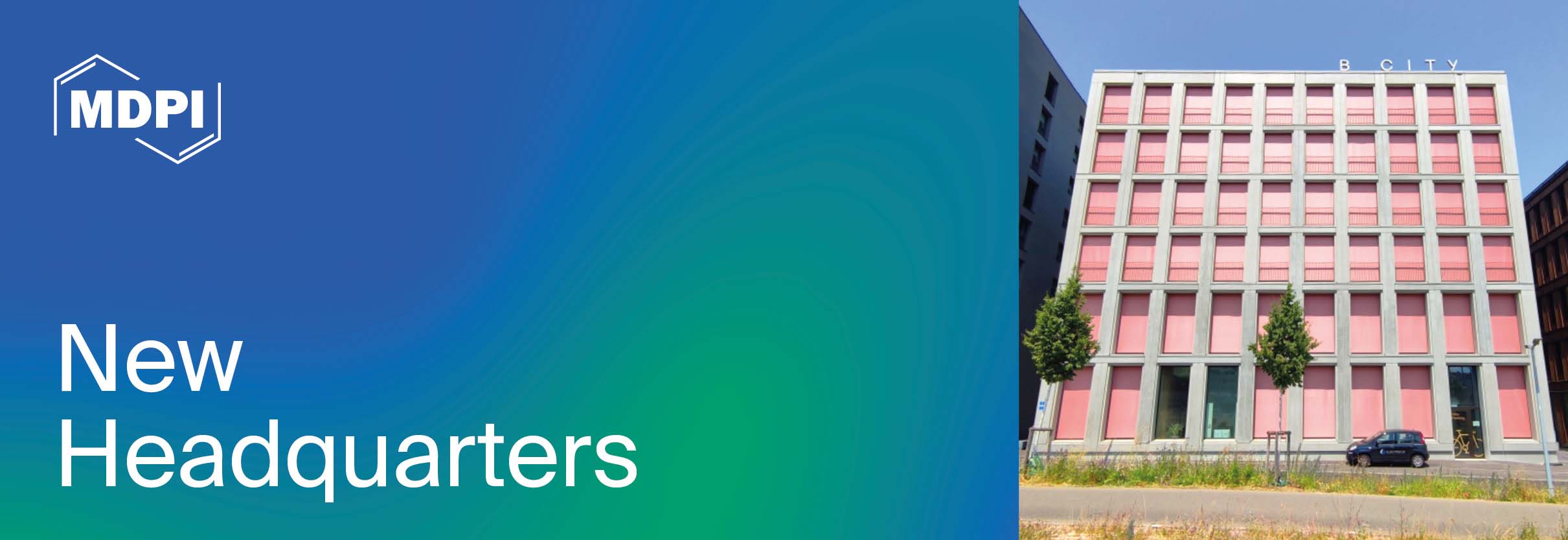
MDPI Moves to New Headquarters in Basel, Switzerland
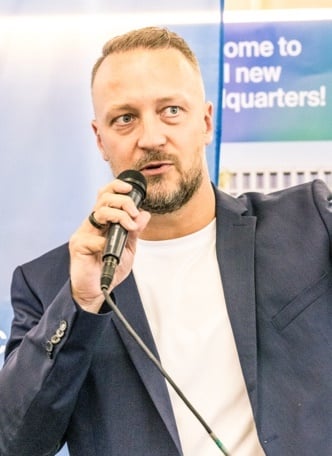
I am excited to share that MDPI has moved to a new state-of-the-art office space in Basel, Switzerland. This move consolidates our operations by bringing together our two previously separated Basel offices into one central location.
We are always growing our talent pool and encourage you to view our Careers Page for the positions available in Basel and across our offices.
New Address: Grosspeteranlage 5, CH-4052 Basel, Switzerland
Effective Date: 1 July 2024
This new chapter in our company’s journey is designed to continue our mission of positioning MDPI as a leader in Open Access (OA) publishing, highlighting our commitment to making scholarly research accessible to everyone.

Boasting modern amenities, improved meeting and event spaces designed to support our growing needs, the new location provides a more collaborative and efficient working environment for our employees. The location offers convenient accessibility to public transportation and is situated near the Basel SBB railway station, with a variety of nearby services and amenities.
In fact, I can see the trains right outside of my window as I write these lines!
This move marks an exciting milestone in MDPI’s development, and I am confident that the new headquarters will serve as an inspiring and productive space for everyone. We also very much look forward to welcoming visitors here. You can read more about MDPI's history here.
“This new chapter continues our mission of positioning MDPI as a leader in OA publishing”
For Those New to MDPI
A pioneer in scholarly, Open Access publishing, MDPI has supported academic communities since 1996. MDPI is leading the transition to Open Science by making a greater proportion of the research conducted worldwide free and accessible to everyone. To date, over 3.5 million researchers have entrusted MDPI with publishing their scientific discoveries. MDPI’s editorial process is bolstered by a network of dedicated reviewers, a team of 6,000 professional, well-trained staff members, and an in-house article submission platform designed to ensure efficient processes within its 440 fully Open Access titles. MDPI supports more than 800 academic institutions worldwide, helping them adhere to national mandates while facilitating authors’ publication in fully compliant (CC BY) Open Access journals.
Impactful Research
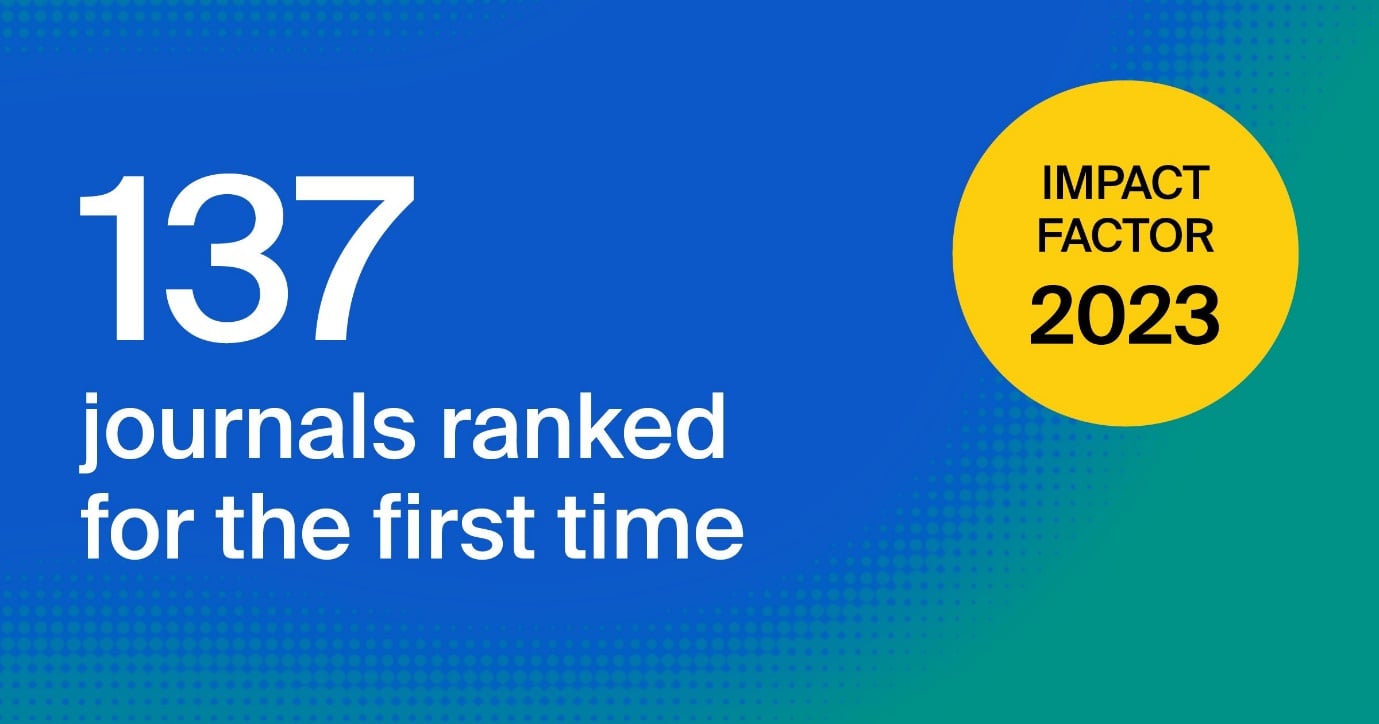
New and Emerging MDPI Journals Making an Immediate Impact
Unpacking some of the Impact Factor updates from the June CEO Letter, I wanted to dive a little deeper into the 137 MDPI journals which received Impact Factor for the first time.
Academic authors highly value efficient publishing processes, robust editorial support, and the opportunity to publish in high-impact journals. We are proud that our newly launched journals typically achieve coverage in the Emerging Sources Citation Index (ESCI) of the Web of Science within just a few years, with a median time of only three years from release to inclusion.
As part of our commitment to advancing academic research and providing high-quality OA publishing, we actively seek new research areas to expand our portfolio of journals. We have a proven track record of successfully establishing new journals.
Our dedicated teams excel in fostering dynamic editorial boards and working closely with Editors-in-Chief (EiC) to define the precise scope and focus of each new journal. Our expertise extends to collaborating with indexing services, ensuring that our journals comply with best practices and are indexed promptly in all relevant databases.
Emerging Titles Ranked for the First Time
Our commitment to excellence is reflected in the annual impact metrics released this past June. The latest edition of the Journal Citation Reports (JCR) showcases the integration of journals from the ESCI in the new unified category rankings, providing a simplified and more complete view of all journals within each subject category, including newly established titles.
Out of 137 new and developing MDPI journals ranked in the 2024 release, 79 are in the top half (Q1 or Q2) of their categories. Here is a breakdown of the number of MDPI’s ESCI-indexed journals by quartile in the JCR:
| Quartile | No. of journals |
| Q1 | 17 (12.4%) |
| Q2 | 62 (45.3%) |
| Q3 | 43 (31.4%) |
| Q4 | 15 (10.9%) |
| Not ranked (humanities-related journals) | 2 |
These rankings highlight our success in rapidly establishing high-impact new journals. Among those that made it directly into the top 25% of their category are the International Journal of Neonatal Screening, Journal of Xenobiotics, Polysaccharides, Smart Cities, and thirteen other journals.
You can browse MDPI journals by Indexing. Simply visit our Journals page and select from the list of Indexing bodies in the top left-hand corner.
Inside MDPI

MDPI Corporate Marketing Strategy and Team Meeting 2024
In July, I hosted the annual Corporate Marketing strategy and team-building activity with 15 of our team members.
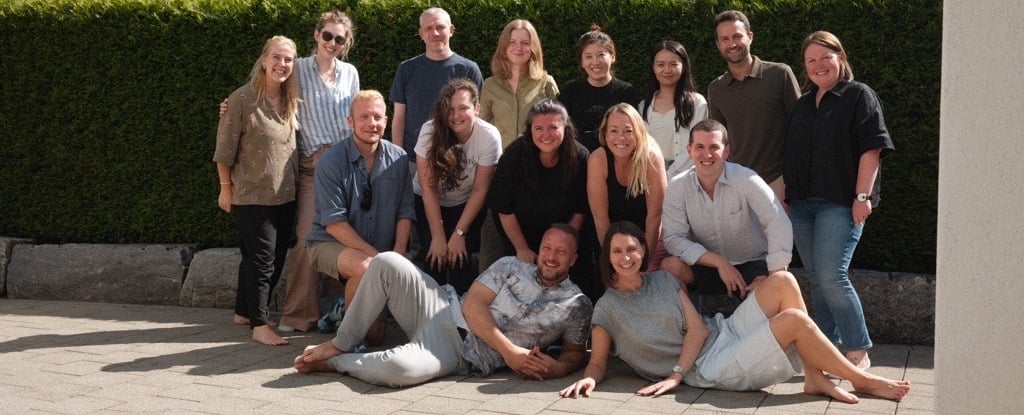
The aim was to align the Corporate Marketing strategy with MDPI's goal of becoming the world's most trusted OA publisher. While we provide a high-level publishing experience for our authors, as seen from our surveys, we need to keep building on our transparent and open communication to foster trust within the scholarly community and continue enhancing our reputation.
The Corporate Marketing team plays an important role as the mouthpiece for all our major activities within MDPI, especially those that model what it means to be a trusted partner. The purpose of the strategy meeting was to develop a feeling of trust in one another and an understanding of how to inspire trust in the stakeholders with whom we interact.
“We need to keep building on our transparent and open communication to foster trust within the scholarly community”

We conducted a set of activities to facilitate that sense of mutual trust and trustworthiness. Examples of some activities we worked on during this strategy-building event include:
- Exploring what trust means
- ‘Letter to self’
- ‘The brand I most trust’
- Most Trusted Academic Publisher
- ‘The brand I would like MDPI to become’
- ‘The 2029 MDPI Annual Report’
- Voice of Customer and Share of Voice – survey/data update on MDPI Brand Experience and Brand Perception
- Integrate Trust-Based Objective into Marketing Plan
- ‘Becoming the MDPI experience’
- ‘Trusting the next steps’
While two days is not enough to finalize a marketing strategy, it is sufficient to get everyone who attended into the mindset of the direction in which we are working. From here, we will develop a program with next steps on main projects, update communications, and collaborate with team leads to incorporate this approach into our work going forward.
As a marketing team, we can communicate our messages, but trust has to be built at every touchpoint in the stakeholder journey. Just talking about it isn’t enough. We need to be about it. That’s a role each of us plays, from editorial to IT, from marketing to HR. We must build trust from the inside out. It starts with each manager and resonates out via every team member.
As a company, our goal is to give all stakeholders with whom we interact – whether internal or external – the experience of working with an organization it can trust.
Coming Together for Science
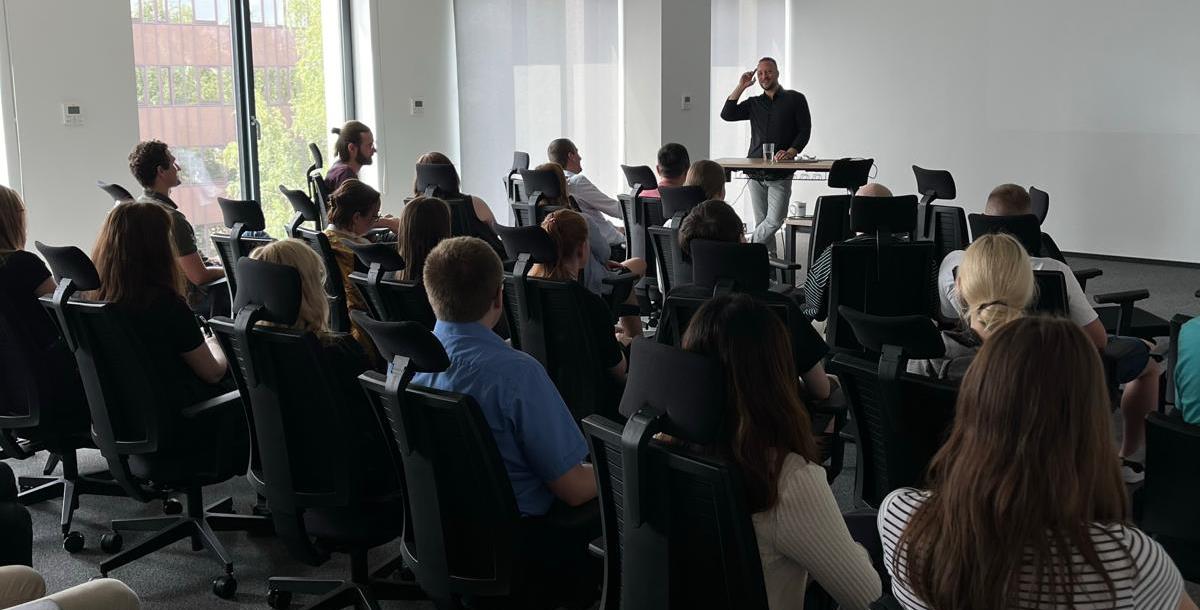
MDPI in Poland: Krakow Office
In July, I had the pleasure of visiting our Krakow office, following my recent trip to Warsaw to meet with the Polish Ministry of Science and Higher Education.
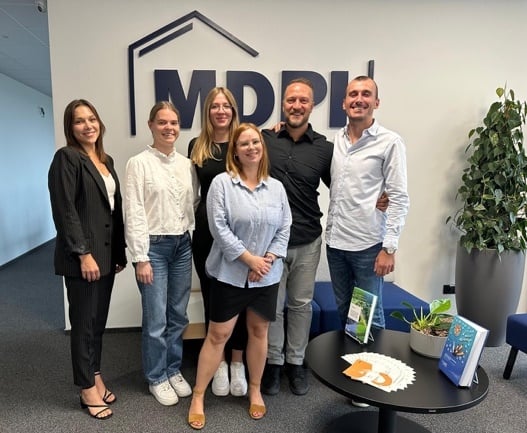
During these visits, I prioritized meeting with our Office Manager, Editorial Director, Group Leads, and members from various teams, including editorial, production, marketing, and journal relationship specialists, to understand their roles and current challenges. Instead of a formal presentation, I opted for an open discussion, sharing updates from headquarters to engage with colleagues in a more personal way.
Our Krakow office has many things to be proud of, including a large number of PhD colleagues (over a third of its staff holds a PhD degree). Krakow provides an opportunity for expanding beyond the 100 colleagues we currently have, by adding new hires in departments including editorial, production and marketing, among others.
About our Krakow office
- Opened in 2020
- 99 staff members as at 1 August 2024
- Main Departments include Editorial, Production, English Department, JRS, PR
Our Krakow office participates in international conferences, conducts author trainings and scholar visits, and engages in local market outreach. The office is also a member of the Polish Chamber of Commerce for High Technology (IZTECH) and is working on expanding its local engagement.
Krakow is the second-largest city in Poland, with a population of about 800,000. It also has a large student population of around 128,000, with seven universities. This means that roughly one in every eight residents is a student.
Poland and MDPI
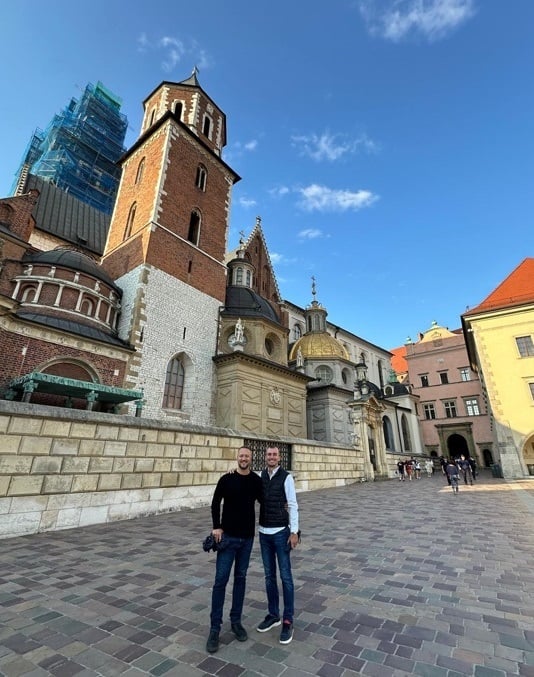
Poland is a crucial market for MDPI. From 2020 to June 2024, Poland ranked 7th in submissions and 5th in publications for MDPI research articles. As at 31 July 2024, Poland ranks 7th in total MDPI publications, with approximately 70,000 research papers.
Between 2020 and June 2024, 61,500 authors from Poland published with MDPI. As at 30 June 2024, there are 1,205 active Editorial Board Members (EBMs) from Poland, with 661 EBMs (55% of the total) having an H-index over 25.
We also have four Editors-in-Chief (EiC) from Poland leading our journals: Coatings, Venereology, Advances in Respiratory Medicine, and Limnological Review, along with six Section EiC.
In 2023, we received approximately 21,000 submissions from Polish-affiliated authors, of which 12,032 were published.
“Poland is a crucial market for MDPI”
Meeting with Ministry of Education
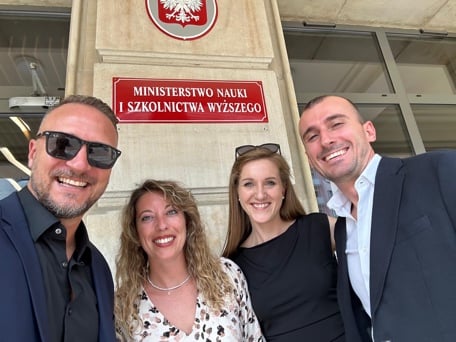
On 22 July, we visited Warsaw to meet with the Polish Ministry of Science and Higher Education.
We were pleased to learn that they are strong supporters of the OA publishing model and value MDPI’s approach to the peer-review process, including our high ethical standards for quality control.
In 2023 Polish authors predominantly published their papers in OA, with MDPI holding the largest market share in OA publications within the country.
Our commitment to collaborating with Polish institutions is evident through our 33 Institutional Open Access Program (IOAP) agreements with prestigious institutions such as the University of Warsaw, the University of Wroclaw, the Jagiellonian University, and Gdańsk University of Technology. Through IOAP discounts, a healthy waiver rate, and our peer-review voucher system, we provide the Polish scholarly community with significant savings in OA publishing. The Minister greatly appreciated these efforts and our commitment to offsetting some of the APC costs.
We discussed industry concerns about the threat of papermills and presented the preventive measures MDPI has in place to mitigate this risk and uphold high ethical standards. We informed them of our commitment to combating papermills, including our involvement with United2Act and the STM Research Integrity Hub, as well as our efforts to expand our research integrity team and explore proactive measures.
Closing Thoughts

MDPI Thought Leadership Op-ed on Open Access is Now Live on Politico
I am pleased to share that our thought leadership Op-ed piece on Open Access (OA) is now live on Politico. This is a nice push for continued influence and support of OA among policymakers and industry leaders.
Why Politico?
Politico's reputation as a highly credible and influential news platform makes it an important venue to reach key opinion leaders (KOL) from academia, policymakers, and thought leaders from many industries. This visibility helps promote the OA philosophy.
Open Access: A Moral Imperative for Progress
In this piece, I discuss the necessity of making scientific research freely available to all. I argue that publicly funded research should be publicly accessible, highlighting how OA democratizes scientific knowledge, accelerates research availability, and fosters collaboration.
“Open Access is a fundamental right for all citizens”
Democratizing scientific communication
The impulse to democratize scientific communication is nothing new. OA may seem like a recent innovation, but its principles have historical roots traceable to Europe in the 15th century. Just as the printing revolution accelerated the dissemination of new ideas, OA publishing unlocks new scientific insights that would otherwise only be accessible to a few.
Benefits for scholars: amplifying impact through Open Access
Authors publishing in an OA journal can expect more citations of their work, increasing its potential impact. Research findings that are freely available are more likely to be cited than those hidden behind a paywall. Freedom of access greatly increases the potential audience for each paper, fostering a sense of community among researchers worldwide. Heightened visibility can attract prospective collaborators and employers for young scientists. At MDPI, we believe that all these factors can only accelerate the advance of science. Additionally, authors retain copyright in their work instead of signing it away, permitting broader dissemination under Creative Commons licenses and increasing its capacity for impact.
The moral imperative
OA is not just a matter of scientific policy; it is a fundamental right for all citizens and a prerequisite for a brighter, more informed future. Publicly funded research should be a top priority, and I am pleased to see policy moving in this direction. Our capacity to generate transformative scientific insights has to be democratized. The question today is no longer whether we can afford to embrace OA; rather, it is whether we can afford not to.
Chief Executive Officer
MDPI AG
6 August 2024
Welcoming New Editorial Board Members of Section “Nanocomposite Materials” in Nanomaterials

We are pleased to announce that six new scholars have recently been appointed Editorial Board Members (EBMs) of Section “Nanocomposite Materials” for the journal Nanomaterials (ISSN: 2079-4991).
|
New Editorial Board Members |
Affiliation |
|
Dr. Zhaohui Zhang |
School of Materials Science and Engineering, Beijing Institute of Technology, China |
|
Prof. Dr. Jintao Zhu |
School of Chemistry and Chemical Engineering, Huazhong University of Science and Technology (HUST), China |
|
Prof. Dr. Changqing Hong |
School of Astronautics, Harbin Institute of Technology, China |
|
Prof. Dr. Zhengdong Cheng |
College of Chemical and Biological Engineering, Zhejiang University, China |
|
Dr. Christophe Daniel |
Department of Chemistry and Biology “A. Zambelli” and INSTM Research Unit, University of Salerno, Italy |
|
Dr. Jiashen Li |
Department of Materials, University of Manchester, UK |
Further details about the Editorial Board can be found at the following link: https://www.mdpi.com/journal/nanomaterials/editors.
We wish our new members every success in both their research and the development of the journal.
Additionally, Nanomaterials is recruiting prestigious scholars worldwide to join our Editorial Board. To apply for this position, recommend potential candidates, or request further information, please contact the Nanomaterials Editorial Office with the following two files attached:
- A full academic CV;
- A short cover letter that details your interest in and enthusiasm for the position.
Nanomaterials Editorial Office
6 August 2024
Nanomaterials | Highly Cited Papers in 2023 in the Section “2D and Carbon Nanomaterials”

1. “Laser-Induced Graphene Microsupercapacitors: Structure, Quality, and Performance”
by Andres Velasco, Yu Kyoung Ryu, Assia Hamada, Alicia de Andrés, Fernando Calle and Javier Martinez
Nanomaterials 2023, 13(5), 788, https://doi.org/10.3390/nano13050788
Available online: https://www.mdpi.com/2079-4991/13/5/788
2. “A Green Synthesis Route to Derive Carbon Quantum Dots for Bioimaging Cancer Cells”
by Karthiga Anpalagan, Jimsheena Valiyakath Karakkat, Raz Jelinek, Nila Nandha Kadamannil, Tian Zhang, Ivan Cole, Kulmira Nurgali, Hong Yin and Daniel T. H. Lai
Nanomaterials 2023, 13(14), 2103, https://doi.org/10.3390/nano13142103
Available online: https://www.mdpi.com/2079-4991/13/14/2103
3. “A Review on Montmorillonite-Based Nanoantimicrobials: State of the Art”
by Syed Imdadul Hossain, Ekaterina A. Kukushkina, Margherita Izzi, Maria Chiara Sportelli, Rosaria Anna Picca, Nicoletta Ditaranto and Nicola Cioffi
Nanomaterials 2023, 13(5), 848, https://doi.org/10.3390/nano13050848
Available online: https://www.mdpi.com/2079-4991/13/5/848
4. “A Breakthrough in Photocatalytic Wastewater Treatment: The Incredible Potential of g-C3N4/Titanate Perovskite-Based Nanocomposites”
by Rashmiranjan Patra, Pranjyan Dash, Pradeep Kumar Panda and Po-Chih Yang
Nanomaterials 2023, 13(15), 2173, https://doi.org/10.3390/nano13152173
Available online: https://www.mdpi.com/2079-4991/13/15/2173
5. “Signatures of Electric Field and Layer Separation Effects on the Spin-Valley Physics of MoSe2/WSe2 Heterobilayers: From Energy Bands to Dipolar Excitons”
by Paulo E. Faria Junior and Jaroslav Fabian
Nanomaterials 2023, 13(7), 1187, https://doi.org/10.3390/nano13071187
Available online: https://www.mdpi.com/2079-4991/13/7/1187
6. “Seed Priming with Single-Walled Carbon Nanotubes Grafted with Pluronic P85 Preserves the Functional and Structural Characteristics of Pea Plants”
by Sashka Krumova, Asya Petrova, Nia Petrova, Svetozar Stoichev, Daniel Ilkov, Tsonko Tsonev, Petar Petrov, Dimitrina Koleva and Violeta Velikova
Nanomaterials 2023, 13(8), 1332, https://doi.org/10.3390/nano13081332
Available online: https://www.mdpi.com/2079-4991/13/8/1332
7. “Silver Nanoparticle/Carbon Nanotube Hybrid Nanocomposites: One-Step Green Synthesis, Properties, and Applications”
by Jun Natsuki and Toshiaki Natsuki
Nanomaterials 2023, 13(8), 1297; https://doi.org/10.3390/nano13081297
Available online: https://www.mdpi.com/2079-4991/13/8/1297
8. “Comparison of Thermal and Laser-Reduced Graphene Oxide Production for Energy Storage Applications”
by M. Belén Gómez-Mancebo, Rodolfo Fernández-Martínez, Andrea Ruiz-Perona, Verónica Rubio, Pablo Bastante, Fernando García-Pérez, Fernando Borlaf, Miguel Sánchez, Assia Hamada, Andrés Velasco et al.
Nanomaterials 2023, 13(8), 1391; https://doi.org/10.3390/nano13081391
Available online: https://www.mdpi.com/2079-4991/13/8/1391
9. “Nanomaterial-Based Advanced Oxidation/Reduction Processes for the Degradation of PFAS”
by Inês M. F. Cardoso, Luís Pinto da Silva and Joaquim C. G. Esteves da Silva
Nanomaterials 2023, 13(10), 1668, https://doi.org/10.3390/nano13101668
Available online: https://www.mdpi.com/2079-4991/13/10/1668
by Wei-Hua Li, Jhen-Dong Lin, Ping-Yuan Lo, Guan-Hao Peng, Ching-Yu Hei, Shao-Yu Chen and Shun-Jen Cheng
Nanomaterials 2023, 13(11), 1739, https://doi.org/10.3390/nano13111739
Available online: https://www.mdpi.com/2079-4991/13/11/1739
4 August 2024
Nanomaterials | Highly Cited Papers in 2023 in the Section “Energy and Catalysis”

1. “Uranium Removal from Aqueous Solutions by Aerogel-Based Adsorbents—A Critical Review”
by Efthalia Georgiou, Grigorios Raptopoulos, Ioannis Anastopoulos, Dimitrios A. Giannakoudakis, Michael Arkas, Patrina Paraskevopoulou and Ioannis Pashalidis
Nanomaterials 2023, 13(2), 363; https://doi.org/10.3390/nano13020363
Available online: https://www.mdpi.com/2079-4991/13/2/363
2. “Recent Progress in Piezoelectric-Triboelectric Effects Coupled Nanogenerators”
by Yifei Wang, Xia Cao and Ning Wang
Nanomaterials 2023, 13(3), 385; https://doi.org/10.3390/nano13030385
Available online: https://www.mdpi.com/2079-4991/13/3/385
3. “Recent Advances in Two-Dimensional MXene for Supercapacitor Applications: Progress, Challenges, and Perspectives”
by Zambaga Otgonbayar, Sunhye Yang, Ick-Jun Kim and Won-Chun Oh
Nanomaterials 2023, 13(5), 919; https://doi.org/10.3390/nano13050919
Available online: https://www.mdpi.com/2079-4991/13/5/919
4. “Ball-Mill-Inspired Durable Triboelectric Nanogenerator for Wind Energy Collecting and Speed Monitoring”
by Qinghao Qin, Xia Cao and Ning Wang
Nanomaterials 2023, 13(5), 939; https://doi.org/10.3390/nano13050939
Available online: https://www.mdpi.com/2079-4991/13/5/939
5. “Microwave Synthesis of Visible-Light-Activated g-C3N4/TiO2 Photocatalysts”
by Maria Leonor Matias, Ana S. Reis-Machado, Joana Rodrigues, Tomás Calmeiro, Jonas Deuermeier, Ana Pimentel, Elvira Fortunato, Rodrigo Martins and Daniela Nunes
Nanomaterials 2023, 13(6), 1090; https://doi.org/10.3390/nano13061090
Available online: https://www.mdpi.com/2079-4991/13/6/1090
6. “Nanofluids for Direct-Absorption Solar Collectors—DASCs: A Review on Recent Progress and Future Perspectives”
by Hussein Sayed Moghaieb, Vincenzo Amendola, Sameh Khalil, Supriya Chakrabarti, Paul Maguire and Davide Mariotti
Nanomaterials 2023, 13(7), 1232; https://doi.org/10.3390/nano13071232
Available online: https://www.mdpi.com/2079-4991/13/7/1232
7. “Advances in WO3-Based Supercapacitors: State-of-the-Art Research and Future Perspectives”
by Giacometta Mineo, Elena Bruno and Salvo Mirabella
Nanomaterials 2023, 13(8), 1418; https://doi.org/10.3390/nano13081418
Available online: https://www.mdpi.com/2079-4991/13/8/1418
8. “DNA-Templated Silver Nanoclusters as Dual-Mode Sensitive Probes for Self-Powered Biosensor Fueled by Glucose”
by Akhilesh Kumar Gupta and Alexey V. Krasnoslobodtsev
Nanomaterials 2023, 13(8), 1299; https://doi.org/10.3390/nano13081299
Available online: https://www.mdpi.com/2079-4991/13/8/1299
9. “Cerium-Based Electrocatalysts for Oxygen Evolution/Reduction Reactions: Progress and Perspectives”
by Huiyi Zhang, Yan Wang, Daqi Song, Liang Wang, Yifan Zhang and Yong Wang
Nanomaterials 2023, 13(13), 1921; https://doi.org/10.3390/nano13131921
Available online: https://www.mdpi.com/2079-4991/13/13/1921
10. “Reduced Graphene Oxide Embedded with ZnS Nanoparticles as Catalytic Cathodic Material for Li-S Batteries”
by Roberto Colombo, Daniele Versaci, Julia Amici, Federico Bella, Maria Laura Para, Nadia Garino, Marco Laurenti, Silvia Bodoardo and Carlotta Francia
Nanomaterials 2023, 13(14), 2149; https://doi.org/10.3390/nano13142149
Available online: https://www.mdpi.com/2079-4991/13/14/2149
2 August 2024
MDPI Romania Author Training Sessions in May
In May, MDPI Romania held three author training sessions – one endorsing an external event and two stand-alone sessions.
The National Session of Scientific Student Communications took place at Technical University Cluj on 17 and 18 May 2024. MDPI Romania sponsored this event and contributed an author training session on the production of research papers and case study analyses. JRS Norbert Kiss gave a presentation called The World of Open Access to explain different open access publishing models and the benefits of open access publishing. His presentation highlighted the impact of open access publishing on scientific progress and innovation.
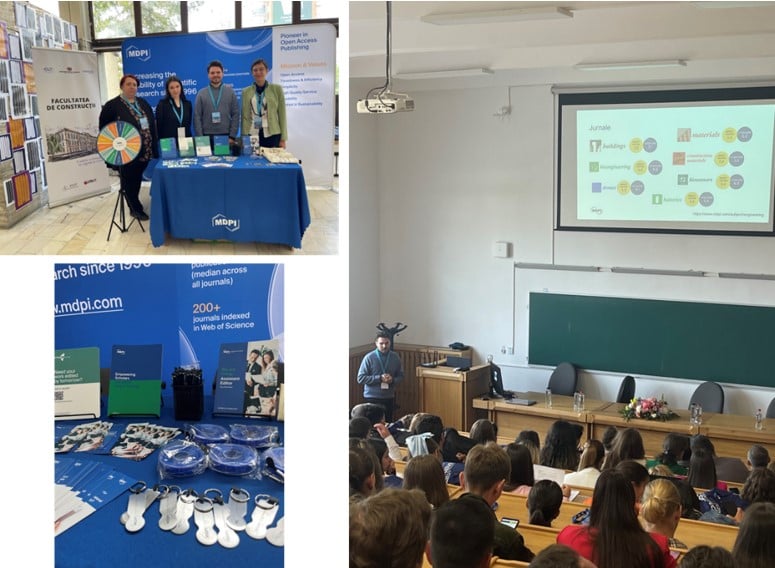
On 29 May 2024, MDPI Romania hosted an author training session for Ph.D. students, early career researchers, and professors at the Carol Davila University of Medicine and Pharmacy. In collaboration with Prof. Andreea Arsene, JRS Ioana Paunescu prepared two presentations: The Steps of the Publishing Process and Elaboration of a Peer Review Report. In her first presentation, she delved into MDPI’s history and mission, MDPI’s editorial process, and MDPI journals of various scopes that are accepting submissions. Her second presentation outlined the types of peer review, the contents of a peer review report by an MDPI reviewer, and the responsibilities of an MDPI reviewer.
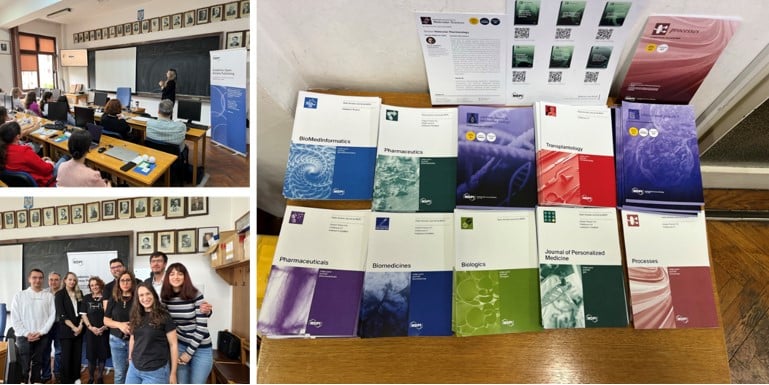
MDPI Romania also hosted an author training session at the Iasi University of Life Sciences on 29 May 2024. JRSs Laurentiu Preda and Cosmin Artan gave four presentations: Efficient Writing of an ISI-Indexed Scientific Article, Benefits of Publishing in the Open Access Model, Various Methods of Open Access Publishing, and MDPI Guide for the Article Review Process. The first three presentations offered guidance on how to improve academic writing, the fourth focused on how to write peer review reports. A highly interactive discussion followed the presentations, during which the JRSs provided extensive answers to attendees’ questions.
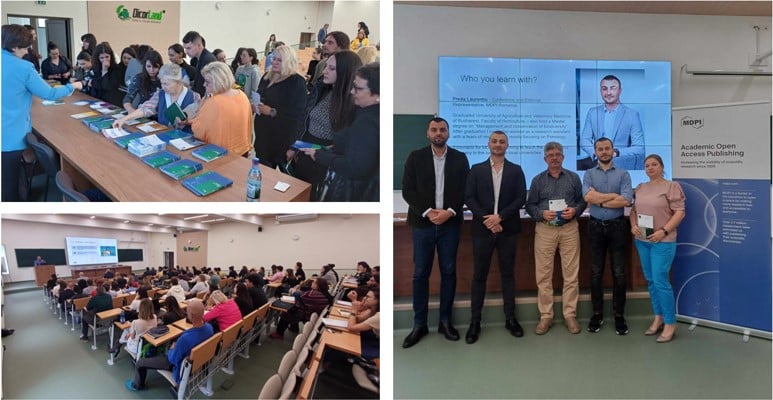
MDPI is grateful for all the attendees, speakers, and organizers involved in these events. Through their enthusiasm and dedication, these events were great successes.
26 July 2024
Nanomaterials Webinar | X-ray Absorption Spectroscopy for the Characterization of Nanostructured Materials, 30 July 2024

In this webinar, esteemed researchers from various research groups will give presentations about work that has led to the publication of important articles, primarily encompassing research that utilizes X-ray absorption spectroscopy in conjunction with other techniques.
Date: 30 July 2024 at 2:00 p.m. CEST | 8:00 a.m. EDT | 8:00 p.m. CST Asia
Webinar ID: 858 6693 2084
Register now for free!
Program:
|
Speaker/Presentation |
Time in CEST |
Time in EDT |
Time in CST Asia |
|
Dr. Simone Pollastri |
2:00–2:10 p.m. |
8:00–8:10 a.m. |
8:00–8:10 p.m. |
|
Dr. Martina Fracchia |
2:10–2:30 p.m. |
8:10–8:30 a.m. |
8:10–8:30 p.m. |
|
Dr. Boby Joseph |
2:30–2:50 p.m. |
8:30–8:50 a.m. |
8:30–8:50 p.m. |
|
Dr. Danilo Oliveira de Souza |
2:50–3:10 p.m. |
8:50–9:10 a.m. |
8:50–9:10 p.m. |
|
Q&A Session |
3:10–3:25 p.m. |
9:10–9:25 a.m. |
9:10–9:25 p.m. |
|
Dr. Simone Pollastri |
3:25–3:30 p.m. |
9:25–9:30 a.m. |
9:25–9:30 p.m. |
After registering, you will receive a confirmation email containing information about joining the webinar. Registrations with academic institutional email addresses will be prioritized.
Unable to attend? Register anyway and we will let you know when the recording is available to watch.
Webinar Chairs and Keynote Speakers:
Dr. Simone Pollastri, 1Elettra-Sincrotrone Trieste, Area Science Park, Basovizza, Trieste, Italy; 2Department of Physics, Computer Science and Mathematics, University of Modena and Reggio Emilia, Via Campi 103, 41125 Modena, Italy
Dr. Martina Fracchia, 1University of Pavia, Department of Chemistry, viale Taramelli 16, 27100 Pavia, Italy; 2INSTM, National Inter-University Consortium for Materials Science and Technology, Via G. Giusti 9, 50121 Florence, Italy
Dr. Boby Joseph, Elettra-Sincrotrone Trieste, S.S. 14, Km 163.5 in Area Science Park, Basovizza, 34149, Italy
Dr. Danilo Oliveira de Souza, Institute of Physics, Rio de Janeiro State University: Rio de Janeiro, 20550-900 – Rio de Janeiro – RJ – Brasil
Relevant Special Issue:
“State-of-the-Art Insights into Nanostructures by X-ray Absorption Spectroscopy”
Edited by Simone Pollastri
Deadline for manuscript submissions: 10 October 2024
Relevant Feature Papers:
“Effect of Ag-Decorated BiVO4 on Photoelectrochemical Water Splitting: An X-ray Absorption Spectroscopic Investigation”
by Ta Thi Thuy Nga, Yu-Cheng Huang, Jeng-Lung Chen, Chi-Liang Chen, Bi-Hsuan Lin, Ping-Hung Yeh, Chao-Hung Du, Jau-Wern Chiou, Way-Faung Pong, K. Thanigai Arul et al.
Nanomaterials 2022, 12(20), 3659; https://doi.org/10.3390/nano12203659
“X-ray Absorption Spectroscopy Study of Thickness Effects on the Structural and Magnetic Properties of Pr2−δNi1−xMn1+xO6−y Double Perovskite Thin Films”
by Mónica Bernal-Salamanca, Javier Herrero-Martín, Zorica Konstantinović, Lluis Balcells, Alberto Pomar, Benjamín Martínez and Carlos Frontera
Nanomaterials 2022, 12(23), 4337; https://doi.org/10.3390/nano12234337
“Kinetics, Electronic Properties of Filled Carbon Nanotubes Investigated with Spectroscopy for Applications”
by Marianna V. Kharlamova
Nanomaterials 2023, 13(1), 176; https://doi.org/10.3390/nano13010176
For more information, please see the following website: https://sciforum.net/event/Nanomaterials-19.
26 July 2024
Prof. Dr. Di Wei Appointed Associate Editor of Section “Nanoelectronics, Nanosensors and Devices” in Nanomaterials

We are pleased to announce that Prof. Dr. Di Wei has been appointed Associate Editor of Section “Nanoelectronics, Nanosensors and Devices” in Nanomaterials (ISSN: 2079-4991).
Prof. Dr. Di Wei is a principal researcher at the Beijing Institute of Nanoenergy and Nanosystems (BINN). He oversees the Iontronics Laboratory, holding the titles of Fellow of the Royal Society of Chemistry (FRSC) and Senior Member of Wolfson College at Cambridge University. Additionally, he holds the adjunct position at both Cambridge University in the UK and Åbo Akademi University in Finland. He has published over 100 journal papers including Nat. Energy, Nat. Commun., PNAS, Adv. Mater., Energ. Environ Sci., Chem. Soc. Rev., Matter, Device etc., as the first/corresponding author. He has also edited three English books, published by Wiley, Cambridge University Press etc., focusing on nanoengineering for energy and information. The book published by Cambridge University Press was highlighted and reviewed in Science. Recent advancements from his research group have been reported by Cell Press, MIT Technology Review, DeepTech, and the American Physical Society (phys.org) etc. His academic achievements have been recognized by the Brian Conway Prize in Physical Electrochemistry from the International Society of Electrochemistry (ISE) and he has received various other prizes from ISE and RSC.
Name: Prof. Dr. Di Wei
Affiliation: Beijing Institute of Nanoenergy and Nanosystems, Chinese Academy of Sciences, Beijing, China
Interests: iontronics; triboiontronics; nanoenergy; contact-electro-chemistry; nanosensor
Website: http://iontronics.group/en/
The following is a short Q&A with Prof. Dr. Di Wei, who shared his vision for the journal with us, as well as his views of the research area:
1. What motivated you to assume the role of Section Associate Editor for this journal?
My academic background and research experience, which include extensive scholarly work and participation in numerous research projects, have provided a robust foundation and fostered critical thinking, meticulous problem-solving, and effective communication skills. I am committed to collaborating with a diverse array of scholars to drive academic progress and make significant contributions to the academic community. In the digital age, leveraging the internet and social media to actively promote the content of academic journals and establish close connections with readers and researchers is crucial. By fully utilizing modern technological means, we can disseminate academic achievements to a broader audience, thereby enhancing the impact of academic journals. In particular, the importance of nanotechnology in nanoelectronics, nanosensors, and devices cannot be overstated. The journal Nanomaterials has a strong history of advancing these fields, and I am eager to contribute to its mission of fostering innovation and excellence in nanotechnology research.
2. Could you share your vision for the Section and its future direction?
The future of nanoelectronics, nanosensors, and devices lies in transcending the limitations of traditional von Neumann architectures. Nanoconfined iontronics, which involves the precise control of ion flow within nano-confined spaces, promises to revolutionize these fields. This innovative approach offers unprecedented applications in efficient, low-energy sensing and energy provision. By leveraging nano-confinement to manipulate ionic behavior, we can develop new generations of sensors and energy devices that are not only more efficient but also significantly reduce energy consumption. This paradigm shift heralds a new era of technological advancement, driving forward the capabilities and impact of nanoelectronics, nanosensors, and devices.
3. How do you envision the evolution of this research field in the coming years?
Iontronics, once a nascent concept when I established my lab, has now emerged as a burgeoning field of interest. Iontronics, which utilizes ions as carriers, offers a wide array of possibilities and stands at the forefront of future technological advancements. By harnessing ions to transmit signals, this field enables the control of charge flux and the regulation of ion currents in ways analogous to neural systems. This capability allows for signal amplification and operation at high frequencies, opening new avenues for innovation and application in advanced electronics and sensing technologies.
4. What are your thoughts on the progress of open access within the publishing realm?
Open access not only improves researchers' access to literature and promotes academic progress but also enhances the efficiency of scholarly communication, becoming a pivotal form of academic research.
5. What advice or principles would you offer to young scholars aiming to pursue similar research paths with a focus on excellence?
The allure of research lies in its inherent uncertainty, much like life itself. While uncertainty can evoke a sense of the unknown, it simultaneously signifies boundless possibilities. It is often said that one must believe in the power of belief to transform the impossible into the possible; this principle applies equally to scientific research. Looking forward, our efforts may seem scattered, but retrospectively, they form a coherent whole. Life resembles a hidden blind box, and the purpose of living is to find and earnestly unveil it.
6. Your research background spans various institutions and countries. What key moments influenced your decisions in this regard?
From China to Finland, to the UK, and back to China, I have consistently adhered to the principle of “conducting useful research” when confronting career crossroads. My ability to face all uncertainties with composure stems from this unwavering commitment. Although my path has not followed a conventional academic trajectory, it is precisely this divergence that has enabled me to confront the unknown and embrace uncertainty.
7. Having secured more than 50 US patents, many of which have had transformative impacts, what challenges do you foresee in transitioning scientific technologies from the lab to industrial applications?
In my book, National Science and Technology Strategy Engine: New R&D Institutions, published by China Economic Publishing Press, I introduce the concept of the two “valleys of death” between science, technology, and the market. The first “valley of death” is the transition from science to technology; the second is the commercialization of technology into the market. Successfully navigating these “valleys of death” requires exceptional talent with distinct skills at each of the three stages. First, in the initial scientific research phase, we need outstanding scientists—individuals deeply passionate about science and capable of conducting pioneering fundamental research. Second, the transition from science to technology demands excellent engineers, whose design and engineering skills can swiftly amplify technological advancements. Third, the phase from technology to market requires extraordinary tech product managers—distinct from current market product managers—who possess profound insights into industry and technological development and a strong understanding of the essence of commerce, all grounded in their education and experience.
We warmly welcome Prof. Dr. Di Wei as the Associate Editor of Section “Nanoelectronics, Nanosensors and Devices” of Nanomaterials, and we wish his every success in his new position.
11 July 2024
Dr. Silvia Villar-Rodil Appointed Section Editor-in-Chief of Section “2D and Carbon Nanomaterials” in Nanomaterials
We are pleased to announce that Dr. Silvia Villar-Rodil has been appointed Section Editor-in-Chief of the Section “2D and Carbon Nanomaterials” in Nanomaterials (ISSN: 2079-4991).

Name: Dr. Silvia Villar-Rodil
Affiliation: Instituto de Ciencia y Tecnología del Carbono, INCAR-CSIC, Francisco Pintado Fe 26, 33011 Oviedo, Spain
Interests: 2D materials; graphene; layered transition metal dichalcogenides (LTMD); molybdenum disulfide (MoS2); porous carbon materials; materials characterization; XPS spectroscopy; energy storage
Website: https://www.incar.csic.es/en/carbon-materials/
https://orcid.org/0000-0002-5832-9971
Dr. Silvia Villar-Rodil is a scientific researcher at the Instituto de Ciencia y Tecnología del Carbono (INCAR), which belongs to the Spanish National Research Council (CSIC), the largest research institution in Spain. She entered the field of nanomaterials when the research field of two-dimensional (2D) materials emerged after the first isolation of graphene. In fact, the research team she belongs to pioneered experimental work on graphene in her country. Her current research activity focuses on the development of scalable preparation and processing methods for graphene and other 2D materials, investigating their potential in energy storage and environmental applications. Her research includes the optimization of 2D materials performance in application and the exploitation of the basic knowledge generated in parallel.
The following is a short Q&A with Dr. Silvia Villar-Rodil, who shared her vision for the journal with us, as well as her views of the research area:
1. What appealed to you about the journal that made you want to take on the role as its Section Editor-in-Chief?
Nanomaterials is a well-known and respected journal in its field. The fact that the scope of this Section, “2D and Carbon Nanomaterials”, covers my field of research and encompasses the full range of materials I have studied throughout my scientific career makes it very exciting to become its Section Editor-in-Chief. For someone whose research career started in carbon materials science, and who entered fully into the field of two-dimensional materials hand in hand with graphene and then expanded the scope of her research to include other 2D materials, this role offers a great opportunity to witness, share and promote the advances of the field from a privileged position.
2. What is your vision for the Section?
I see this Section as an open platform for the advancement of scientific research in its scope and as a window into the field of research for the whole scientific community. I look forward to the discovery and publication of new methodologies for the preparation and processing of 2D and carbon nanomaterials with optimized performance in relevant applications to address our society’s demands.
3. What does the future of this field of research look like?
New preparation avenues are expected to open up for an increasing number of 2D materials, including those coming from non-layered 3D precursors. The availability of a large number of 2D materials with different characteristics will open up the possibility of their tailor-made development for each specific application. Their combinations will give way to an even greater number of both 2D and 3D materials with emergent and tunable properties. To this end, new methodologies will have to be developed for the large-scale preparation of both 2D materials-based heterostructures and superlattices. It is also expected that new and better strategies will be developed to address the tendency of 2D nanolayers to restack, an issue that impedes fully exploiting their potential. Not only incremental but also disruptive advancements are expected to arise from the implementation of 2D and carbon nanomaterials application to diverse fields, such as nanomedicine, nanosensing, optoelectronics, catalysis or energy storage, among others. Overcoming difficulties with scalability and cost-effectiveness will be crucial to enable the actual implementation of these materials in application. Given the increasing focus on sustainability in science policy worldwide, more sustainable preparation and processing methodologies for 2D and carbon nanomaterials are expected to become available in the coming years. This trend will also be reflected in the increasing use of 2D and carbon nanomaterials in sustainability-related applications, such as catalysis for pollutant degradation and energy storage in relation to decarbonization. As with any other type of nanomaterial, attention must be paid to potential toxicity and health effects, as well as biocompatibility in medical applications.
We warmly welcome Dr. Silvia Villar-Rodil as the Section Editor-in-Chief of the Section “2D and Carbon Nanomaterials”, and we wish her every success in her new position.
10 July 2024
MDPI's Newly Launched Journals in June 2024
 Five new journals covering multiple subjects have launched their inaugural issue in June 2024. We are excited to be able to share with you the newest research rooted in the value of open access.
Five new journals covering multiple subjects have launched their inaugural issue in June 2024. We are excited to be able to share with you the newest research rooted in the value of open access.
We would like to express our deepest appreciation to all the Editorial Board Members and each journal will ensure its high-quality output using excellent editorial and rigorous peer review processes, to ensure that the articles achieve high impact and visibility.
Please feel free to browse and discover more about the new journals below.
|
Journal |
Founding Editor-in-Chief |
Journal Topics (Selected) |
 |
Prof. Dr. Marco Ranucci, IRCCS Policlinico San Donato, Italy |
anaesthetic medications; blood and fluid management; pain management; critical care; critical illness | view journal scope | submit an article |
 |
Dr. Giovanni E. Cacciamani, University of Southern California, USA |
surgical/procedural complications; complications; perioperative adverse events; postoperative adverse events | view journal scope | submit an article |
 |
Prof. Dr. Gassan Hodaifa, Universidad Pablo de Olavide, Spain |
laboratory management; laboratory safety; protective equipment; laboratory problems and challenges; laboratory Innovation | view journal scope | submit an article |
 |
Prof. Dr. Jan S. Suchodolski, Texas A&M University, USA |
companion animals health and disease; veterinary care and nutrition; genetics and genomics; behavior and welfare; human-animal relations | view journal scope | submit an article |
 |
Prof. Dr. Pierfrancesco De Paola, University of Naples Federico II, Italy |
real estate appraisal; economic and financial valuation of real estate projects; sustainable real estate; housing and urban economics | view journal scope | submit an article |
We wish to thank everyone who has supported the development of open access publishing. You are welcome to send an application here, or contact the New Journal Committee (newjournal-committee@mdpi.com) if you would like to create more new journals.




